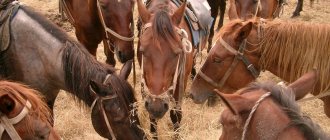"Save me, God!".
Thank you for visiting our website, before you start studying the information, please subscribe to our Orthodox community on Instagram, Lord, Save and Preserve † - https://www.instagram.com/spasi.gospodi/. The community has more than 60,000 subscribers. There are many of us like-minded people and we are growing quickly, we post prayers, sayings of saints, prayer requests, and timely post useful information about holidays and Orthodox events... Subscribe. Guardian Angel to you!
Many religious people are interested in the question of whether animals have souls. Surely everyone who has kept a pet in their home knows how hard it is to lose it. And everyone would like to meet their pet there when they get to heaven. It must be said that the opinion on this matter is not unambiguous. Some priests claim that animals have it, while others say that they do not. Let’s try to figure out what the Bible tells us about this below.
Where does the division of animals into clean and unclean come from?
From the Bible we know that man was created as the king of all living things. In addition to direct words about the transfer of power over the earthly world to Adam (Genesis 1:28 ), God brought all the animals to him and commanded him to give them names. The latter in the system of ancient Eastern ideas meant dominion, which was understood as care and responsibility. Peace and harmony reigned in the relations between the inhabitants of paradise; man existed in organic unity with the environment. Ideas about this time were reflected in the prophet Isaiah’s description of the future earth transformed by God: Then the wolf will live with the lamb, and the leopard will lie down with the kid; and the calf, and the young lion, and the ox will be together, and a little child will lead them. And the cow will feed with the she-bear, and their cubs will lie down together, and the lion will eat straw like the ox. And the child will play over the asp's hole, and the child will stretch out his hand into the snake's nest. They will not do evil or harm in all My holy mountain, for the earth will be filled with the knowledge of the Lord, as the waters cover the sea (Isaiah 11 :6-9).
The paradise idyll ended the moment Adam and Eve followed the lead of the tempting serpent. The fall of the first people not only damaged human nature, but turned into a disaster for the entire universe, distorting the Creator’s original plan for the world He created. Since then, as the Apostle Paul writes, the whole creation has been groaning and tormenting together (Rom 8:22 ). The world has become an aggressive environment and plunged, in the words of the English philosopher Thomas Hobbes, into a state of “war of all against all.”
Time passed, and God appeared to Moses with the command to lead the Jews to the Promised Land, and on the way in the desert he gave the prophet new revelations, which made up the first five books of the Old Testament. Among them was the book of Leviticus. In it, the entire fauna is considered solely from the point of view of the permissibility of its consumption as food, and a gastronomic division is given into clean and unclean animals, fish, birds, insects and reptiles. The former may be eaten, but the latter must be abhorred (Lev 11 :1-47). Some types of animals could not be touched at all, so as not to become defiled and become unclean.
This emphasized utilitarianism and detailed instructions for the treatment of animals, drawn up shortly after the Jews left Egypt, are not accidental. The Egyptian pantheon was filled with zoomorphic images. Many animals, including those given unclean status in the Bible, had sacred status. These memories were still fresh among the Israeli people. And the meaning of the appearance of the Old Testament classification of animals was the need to eradicate from the consciousness of the ancient Jews the remnants of the pagan zoomorphic religion and protect them from the temptation to fall into idolatry. Here is how Patriarch Photius of Constantinople wrote about this: “The pure began to be separated from the unclean not from the beginning of the universe, but received this distinction due to certain circumstances. For since the Egyptians, who had the Israelite tribe in their service, gave divine honors to many animals and made bad use of them, which were very good, Moses, so that the people of Israel would not be carried away to this bad use and would not ascribe divine honor to the dumb, it is fair in the legislation called them unclean - not because uncleanness was inherent in them from creation, in no case, or uncleanness was in their nature, but because the Egyptian tribe did not use them cleanly, but very nasty and wicked.”
Do animals have souls?
To find out whether animals will be in heaven, you first need to find out whether they are endowed with a soul. Holy Scripture gives an unequivocal answer to this: yes, they are endowed. The Book of Genesis mentions this several times:
And God said, Let the earth produce living creatures according to their kinds, cattle and creeping things and wild beasts of the earth after their kinds. And so it became. (Gen. 1:24)
This “living soul,” by the way, is what distinguishes all fauna from the plant world. However, from Scripture we also learn that the soul of animals is in their blood (Lev. 17:11). This means that the soul of animals is not endowed with immortality, like that of humans, it dies along with the body.
The soul of animals is only a set of psycho-emotional properties, thanks to which animals have will and memory, the rudiments of intelligence, and also know how to feel. But they do not have the image and likeness of God, they do not have the same spiritual and personal qualities as we do. Animals live according to biological laws; the concept of morality, the distinction between good and evil, is alien to them.
How do attitudes toward animals change in the New Testament?
The relevance of the Old Testament division into clean and unclean animals, edible and those that cannot even be touched for fear of becoming unclean, disappears in the New Testament. The new ethics received its symbolic expression in a vision of the Apostle Peter, who, getting hungry while praying, saw a huge vessel descending from heaven, full of both clean and unclean animals and birds. In response to Peter’s refusal to eat unclean creatures, a voice was heard from heaven: what God has cleansed, do not consider unclean (Acts 10:15 ). The vision also had one more meaning: the Lord made Peter understand that the preaching of the Gospel was addressed not only to the chosen people, but also to the pagans, whom the Jews had previously abhorred. This idea was later expressed by the Apostle Paul, who said that in the Church there is neither Greek nor Jew, circumcision nor uncircumcision, barbarian, Scythian, slave, free, but Christ is all and in all (Col. 3:11 ).
In the New Testament era, the previous utilitarian attitude towards animals changed. Saint Basil the Great already defined their purpose as follows: “One (animal - editor’s note) was created to serve man, and the other so that he could contemplate the wonders of creation, while the other is scary for us, in order to admonish our negligence.” In the history of the Church we see many examples of the merciful and friendly attitude of holy people towards their “little brothers”. Life stories also contain many examples of devotion, indifference, selflessness and other qualities exhibited by animals.
Among the most famous biographies of saints, in whose lives the animals they tamed played a large role, one can name the lives of Gerasim of Jordan, who is even depicted on icons in the company of a lion, Macarius of Alexandria, who gave moral lessons to a hyena, Cosmas and Damian, who healed a camel. Christian ethics thus implies a caring attitude towards animals, as well as towards all of God’s creation, which in its original form is very good (Genesis 1:31 ). The example of Macarius of Alexandria, already mentioned above, is illustrative. One day the saint killed a mosquito that was pestering him and then was tormented by remorse until he took revenge on himself by submitting his body to the bites of a countless horde of blood-sucking insects.
After death
There is no exact description of what happens to the souls of our pets after death in any of the religious sources. However, there are plenty of thoughts from priests on this topic. Thus, Theophan the Recluse believed that there is a certain “world soul”, to which the souls of dead animals join: “Souls lower than the spirit and man are immersed in the soul of the world.” Some religious leaders suggested that the soul of our little brothers simply dies after their death. For example, St. Gregory the Dvoeslov wrote: “... it is indecent for the image of the great God (that is, the human soul) to be destroyed ingloriously, as reptiles and irrational animals are destroyed.”
Thus, it turns out that in both versions the soul of animals simply ceases to exist after death, at least as a separate substance.
Do animals have souls?
The most frequently asked questions related to animals are: do they have a soul and is it immortal, will they go to heaven and can you pray for them. Let's answer them in order.
Regarding the soul, there is a unanimous opinion among Christian theologians: yes, animals have a soul. As for immortality, the most common idea is the finitude of the soul of animals, since it is not an independent entity, separate from the body. Thus, Basil the Great, referring to the book of Leviticus, writes: “Since, according to Scripture, the soul of every animal is its blood (Lev. 17:11 ), and condensed blood usually turns into flesh, and decayed flesh decomposes into the ground, then, throughout justice, the soul of beasts is something earthly.” In this case, the soul is understood as a certain creative principle that animates the body. Accordingly, if the soul is not immortal, then the question of animals inheriting paradise does not arise at all.
At the same time, there is another point of view. Already in the Bible, in the Book of the Prophet Joel, there is a phrase: even the animals in the field cry out to You (God - Ed.) (Joel 1:20 ). In the absence of a soul, which is something more than just a principle that animates the body, such an invocation is hardly possible. Some saints also spoke in favor of the existence of an immortal soul in animals and the possibility of inheriting eternal life. Thus, in his interpretation of the above passage from the prophet Isaiah about the peaceful coexistence of predatory and herbivorous animals in a transformed world, the early Christian apologist Hieromartyr Irenaeus of Lyons, opposing allegorical reflections on this topic, writes: “I know that some are trying to attribute this to wild people belonging to to various peoples and various occupations, who will believe and, having believed, will converge with the righteous. But although even now this is true in relation to some people from different tribes who come to the same mind of faith, nevertheless, in the resurrection of the righteous it will also happen in relation to those animals.” The Monk Simeon the New Theologian also writes that in the future there will be a renewal of the entire world, and not just the human population. Another argument in favor of the presence of a certain higher mental component in animals is their rich emotional world. So the question remains open.
Philosophy and soul
Questions about the immortality of consciousness are asked not only by deeply religious people. This topic occupies the minds of many philosophers, scientists and even atheists.
Philosophy of Tibet
Tibetan monks believe that after death we are all reincarnated into a living form. Moreover, the new hypostasis can be completely different: from an earthworm to an elephant. The chances of being reborn as a human are very small, and therefore it is quite likely that some insect in a past life was someone’s relative.
Buddhism teaches us to love and treat with care everything that has a soul. We must learn to sympathize, to show kindness to lower living beings as if they were human.
Buddhism teaches love and respect for everything that has a soul
People familiar with Tibetan philosophy often wonder about the formation and development of consciousness. If you look at it through the prism of evolution, you can see that man stands at the highest stage of the evolutionary process. This theory is confirmed by the case of a psychic who was asked: “Where did the souls of long-extinct dinosaurs go?” The clairvoyant answered briefly: “They are here.”
Metempsychosis
This doctrine, which originated in Ancient Greece, preaches the reanimation of a dead being into a newly born one. In fact, the theme of the evolution of the spirit continues here. According to the philosophy of metempsychosis, before becoming human, consciousness lives through several cycles in animal incarnation.
The number of rebirths depends on self-awareness: the faster the spirit becomes individual, the greater the chance that in the next life it will acquire a human shell. However, not all souls are capable of evolving, and therefore there is the concept of a collective mind, when entities merge together.
Metempsychosis preaches the reanimation of a dead being into a newly born one.
The pet’s consciousness will move faster to the next stage of development if during its lifetime it was loved and treated like a family member or a child.
Author's advice
The idea of identifying the animal soul with the human soul is also evident here. Our essence is very strong, and therefore makes the spirit of a dog or cat gain independence.
Being attached to our pets, we have a hard time experiencing their departure to another world. However, there is no need to be sad, because souls are immortal, and therefore in Heaven we will have a pleasant meeting with our favorites.
If you find an error, please select a piece of text and press Ctrl+Enter.
How do animals differ from humans?
But if we agree with the opinion that animals have a soul, then how do they differ from humans? The fact is that, according to the Christian view of man, he consists of spirit, soul and body. Of these, the soul is what covers our psyche, thought processes, and determines the characteristic features of our personality. The Spirit is the breath of God, which the Creator, in the final act of creating Adam, breathed into his face (Gen. 2 :7) and thereby awakened him to life. This is what connects us with God, what drives our desire for Heaven. In the patristic heritage, the spirit can also be considered as the highest part of the soul, which determines a person’s ability to communicate with God. It is the spirit that distinguishes man from the rest of the created world and allows us to lead a spiritual life. Animals do not have such a spirit.
Is it possible to pray for pets?
At the same time, you can pray for pets. For example, in the case of their illness (but not about their posthumous fate). This also demonstrates man’s care for all creation. You can ask in your own words, you don’t have to look for any special prayer. However, in Orthodoxy there are several saints to whom it is customary to pray for animals.
George the Victorious, the martyrs Tryphon, Blasius, Florus and Laurus - they are mainly asked for the recovery and preservation of farm livestock. In some cases, you can even sprinkle holy water on the living creatures. But it is impossible to give them such water inside, just like prosphora or any other shrine, since this desecrates the shrine itself.
Of course, you can only pray for the health of your pets, and not for their repose, regardless of whether the animals will be in heaven. And if this can somehow be allowed in a child’s prayer, out of naivety, then for an adult it will turn out to be at least strange.
Is it possible to pray for animals?
Of course, animals cannot participate in church sacraments, the meaning of which is the healing of fallen human nature by the grace of God and the union of man with God. Animals did not commit original sin; it was not for their sake that the Lord came to earth, died and rose again. But they form part of our Christian life in the sense that we can and should pray for them.
Our missals contain prayers for animals compiled a long time ago. For example, a prayer for the blessing of a herd or a prayer service during a devastating disease of livestock. Recently, in 2015, the Holy Synod approved the “Rite of Prayer Singing for the Preservation of God’s Creation,” which is performed annually on the first Sunday in September. It glorifies God, who created the originally beautiful world, recognizes people's responsibility for the environmental problems of our time, including the disappearance of some species of animals, birds and plants, and repents for their consumerist attitude towards nature.
A touching story about prayer for a pet is given in the collection of teachings of our holy contemporary Paisius the Holy Mountain: “It amazes me,” the elder said, “how one humble thought instantly brings into action the Grace of God. Once a kitten wandered into my cell. The poor guy apparently ate something wrong, got poisoned and now asked for help, writhing in pain, jumping like an octopus when he is hit by stones... It was a pity to look at him, but what can you do? I crossed him once, twice, nothing! “Look at you,” I said to myself then, “how many years have you been a monk, but you can’t even help an unfortunate kitten!” As soon as I blamed myself, the kitten, which was already on its last legs, suddenly came to its senses. He ran up, began to rub against his legs and jump joyfully. This is the power of humility! That is why it is said: “In our humility the Lord will remember us” (Ps. 135:23)».
The example with Elder Paisius’s kitten is closer to modern people, who associate a pet more with the furry inhabitants of apartments and country houses than with cattle. There is no special prayer rite in the Church for the healing of cats, dogs, chinchillas or guinea pigs. But if a pet gets sick, no one stops us from asking God in our own words to ease the suffering of the unfortunate animal. But there is no need to pray for the repose of animals. After all, the meaning of this prayer is the forgiveness of sins, and such a category as sin is not applicable to animals.
Animals are our neighbors and we need to take care of them, as the Bible teaches.
It is right and Christian to worry about the fate of your animals. Let us quote the thought of Tatyana Mikhailovna Goricheva:
“Often Christians interpret the commandment to love one's neighbor based on biological and biographical criteria. Who is my neighbor?
Many will answer: my children, my friends, my colleagues. This myopia has brought us to an apocalyptic situation where we are no longer the “masters” of our land.
We are more like robbers. The earth experiences the fate of man, “who was stripped of his clothes, wounded, and gone away, leaving him barely alive” (Luke 10.30).
The Lord Jesus Christ understood the commandment of love differently. When he was asked: “Who is my neighbor?”, he immediately spoke about the one who suffers the most: “A certain man was walking from Jerusalem to Jericho and was caught by robbers...”
Today a merciful Samaritan would rush to help the earth, animals, air, trees. They are our neighbors, mutilated and robbed by us.”
Tatyana Mikhailovna Goricheva
philosopher
But it is not enough to think about the spiritual world. We still need to act in the physical world. Taking care of animals is our task, as people recently began to notice. Father Vladimir (Golovin) notes in the video below that such care is not just a task, but a real commandment of God, according to the Bible:
Caring for animals is a special ministry. Some help the homeless, some the disabled, some the elderly. Among the animals there are also plenty of homeless people, disabled people and old people. And helping them cannot be called a non-Christian service.
Let us conclude with the words of Paisius the Holy Mountain:
“For animals, man is God. Just as we ask God for help, they ask man for help.”
Paisiy Svyatogorets
old man
By leaving a comment, you accept the user agreement
Is it possible to love animals more than humans?
Man is called to treat animals, as well as all of God's creation, as a manifestation of the goodness and beauty of the Creator, addressed to people. However, here it is also important not to overdo it and not find yourself in a situation where a four-legged pet becomes more expensive than its neighbor and receives more love and care than those people who really need our participation. Let us recall the description of the kennel that became the cause of the quarrel between Dubrovsky and Troekurov in Pushkin’s famous story: “The owner and guests went to the kennel yard, where more than five hundred hounds and greyhounds lived in contentment and warmth, glorifying the generosity of Kirill Petrovich in their canine language. There was also an infirmary for sick dogs, under the supervision of the staff doctor Timoshka, and a department where noble bitches gave birth and fed their puppies.” Greyhounds, surrounded by care, lived better than some serfs, as old Dubrovsky said with bitterness. This attitude towards animals harms both them and their owners.
“The more I get to know people, the more I love dogs” - this famous aphorism is attributed to many thinkers, writers and historical figures. It was expressed in poetic form by the Russian poet A. Fedotov. His poem “Hunting” ends with the lines “The more people I know, the more I study life, the more I love animals.” However, from a Christian point of view, such preference for animals over people is wrong and spiritually dangerous. It is important to remember: the salvation of each of us is determined by the degree of our love not for animals, but for God and people, including (and even especially) those whom we consider strangers or enemies. This is clearly stated in the following Gospel episode:
The Pharisees... gathered together. And one of them, a lawyer, tempting Him (Jesus - Ed.), asked, saying: Teacher! What is the greatest commandment in the law? Jesus said to him: Thou shalt love the Lord thy God with all thy heart, and with all thy soul, and with all thy mind: this is the first and greatest commandment; the second is similar to it: love your neighbor as yourself; On these two commandments hang all the law and the prophets (Matt. 22:35–40).
Love for God and neighbor is not opposed to love for animals, but the latter becomes a consequence of the former, as evidenced by the above examples of holy people. The more we love God, the more we are imbued with His love for us, the wider our heart becomes, in which there is a place not only for people, but also for animals, and for all of God’s creation. Love for animals becomes a consequence of a general internal change in a person’s state. In our eyes, the world is returning to the once lost unity, where love permeates everything, and we are not torn apart by attachment to some along with rejection of others.
Photo https://ru.depositphotos.com
"Baby, I'll pray for your turtle..."
And yesterday my daughter asked me to take her to Optina Pustyn. We are now not far away, in the village where we have a house. - Why, we were just in our church, with Father Leo? - I really need! It must be so... Let's go. In the monastery, my daughter went to the table with notes, took a pen and piece of paper and began to slowly write something. I looked over her shoulder. In large childish letters, with errors, she wrote: “On the repose of the turtle Moti.” She wrote and handed it to me: “Mom, give it to the monks, let them pray.” I looked at this piece of paper, at Tonya, and didn’t know what to do. I immediately remembered that grandmother and our vile hissing after her: “Soon the hamsters will be brought to the funeral service... And with horror I imagined how the monk would tell her menacingly: “Your turtle will not be in the Kingdom of Heaven!” And she didn’t die, she died!” “Mommy, please,” Tonya whispered. I couldn’t tell her that the monks might not take it. And I went... I handed out the note: - Excuse me, this is the case... My daughter is here... The monk took the piece of paper, read it carefully, smiled: - Where is your girl? - There she is... - Baby, I will definitely pray for your turtle. What's your name?.. Tonya? And for you too. - And then we will meet her in heaven? - Necessarily. He gave her a candle and stroked her head. - You have a very good daughter... Tonya left inspired: - Mommy, now my Mota will be happy there! And someday we will be together again.











